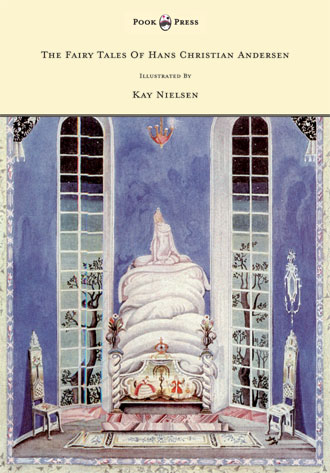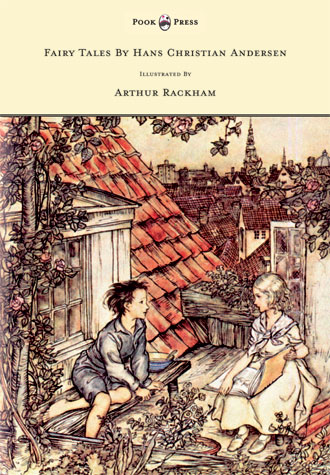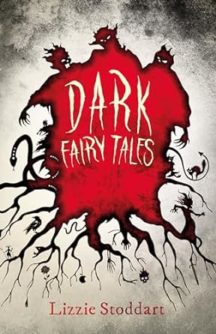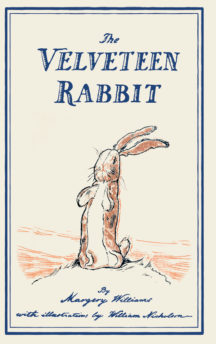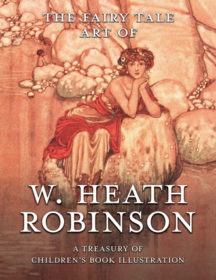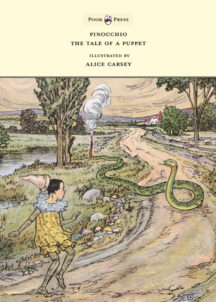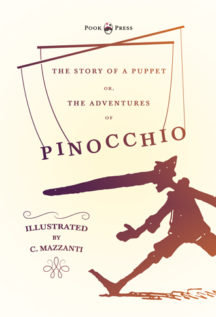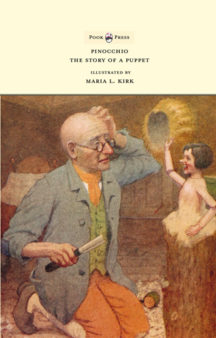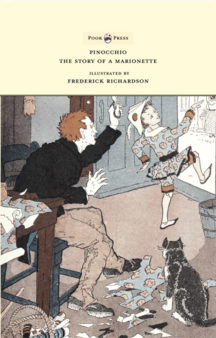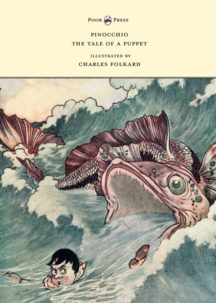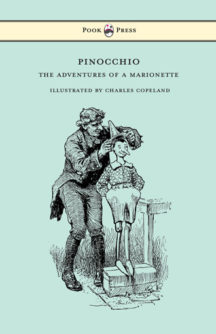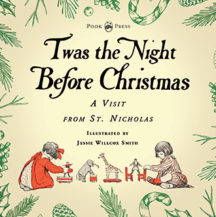The Elder Tree Mother
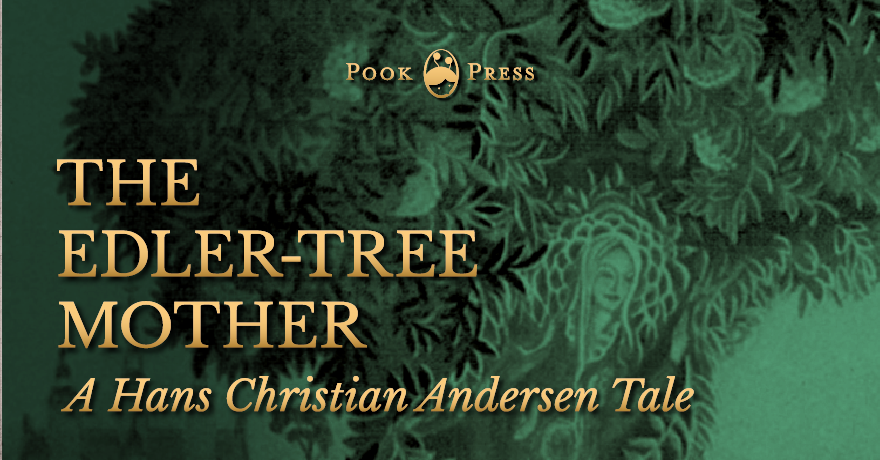
This story is taken from The Fairy Tales of Hans Christian Andersen – Illustrated by Kay Nielsen. It was a project that took Nielsen twelve years to complete, and his illustrations perfectly capture the other-worldly spirit of Andersen’s subject matter.
A story for a boy who got his feet wet, a golden wedding-day, and a tale in a teapot.
The Elder Tree Mother
A Hans Christian Andersen Tale
THERE was once a little boy who had caught cold; he had gone out and got wet feet; no one could imagine how it had happened, for it was quite dry weather. Now his mother undressed him, put him to bed, and had the tea-urn brought in to make him a good cup of elder tea, for that warms well. At the same time there also came in at the door the friendly old man who lived all alone at the top of the house, and was very solitary. He had neither wife nor children, but he was very fond of all children, and knew so many stories that it was quite delightful.
“Now you are to drink your tea,” said the mother, “and then perhaps you will hear a story.”
“Ah! if one only could tell a new one!” said the old man, with a friendly nod. “But where did the little man get his feet wet?” he asked.
“Yes,” replied the mother, “no one can imagine how that came about.”
“Shall I have a story?” asked the boy.
“Yes, if you can tell me at all accurately—for I must know that first—how deep the gutter is in the little street through which you go to school.”
“Just half-way up to my knee,” answered the boy, “that is, if I put my feet in the deep hole.”
“You see, that’s how we get our feet wet,” said the old gentleman. “Now I ought certainly to tell you a story; but I don’t know any more.”
“You can make up one directly,” answered the little boy. “Mother says that everything you look at can be turned into a story, and that you can make a tale of everything you touch.”
“Yes, but those stories and tales are worth nothing! No, the real ones come of themselves. They knock at my forehead, and say, “Here I am!”
“Will there soon be a knock?” asked the little boy, and the mother laughed, and put elder tea in the pot, and poured hot water upon it.
“A story! a story!”
“Yes, if a story would come of itself; but that kind of thing is very grand; it only comes when it’s in the humour.—Wait!” he cried all at once; “here we have it. Look you; there’s one in the tea-pot now.”
And the little boy looked across at the tea-pot. The lid raised itself more and more, and the elder flowers came forth from it, white and fresh; they shot forth long fresh branches even out of the spout, they spread abroad in all directions, and became larger and larger; there was the most glorious elder bush—in fact, quite a great tree. It penetrated even to the bed, and thrust the curtains aside; how fragrant it was, and how it bloomed! And in the midst of the tree sat an old, pleasant-looking woman in a strange dress. It was quite green, like the leaves of the elder tree, and bordered with great white elder blossoms; one could not at once discern whether this border was of stuff or of living green and real flowers.
“What is the woman’s name?” the little boy asked.
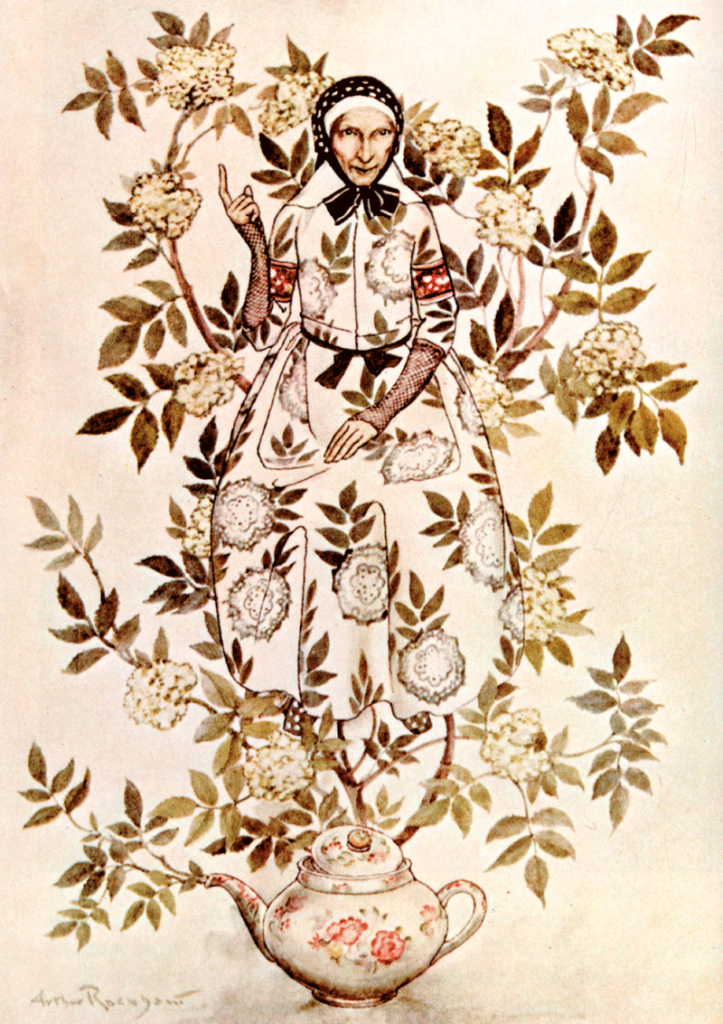
“The Romans and Greeks,” replied the old man, “used to call her a Dryad; but we don’t understand that: out in the sailors’ quarter we have a better name for her; there she’s called Elder Tree Mother, and it is to her you must pay attention; only listen, and look at that glorious elder tree.”
“Just such a great blooming tree stands out in the sailors’ quarter; it grew there in the corner of a poor little yard, and under this tree two old people sat one afternoon in the brightest sunshine. It was an old, old sailor, and his old, old wife; they had great-grandchildren, and were soon to celebrate their golden wedding; but they could not quite make out the date, and the Elder Tree Mother sat in the tree and looked pleased, just as she does here. ‘I know very well when the golden wedding is to be,’ said she; but they did not hear it—they were talking of old times.”
“ ‘Yes, do you remember,’ ” said the old seaman, ‘when we were quite little, and ran about and played together! It was in the very same yard where we are sitting now, and we planted little twigs in the yard, and made a garden.’ ”
“Yes,” replied the old woman, “I remember it very well: we watered the twigs, and one of them was an elder twig; that struck root, shot out other green twigs, and has become the great tree, under which we old people sit.”
“Surely,” said he; “and yonder in the corner stood a butt of water; there I swam my boat; I had cut it out myself. How it could sail! But I certainly soon had to sail in a different fashion myself.”
“But first we went to school and learned something,” said she, “and then we were confirmed; we both cried, but in the afternoon we went hand in hand to the round tower, and looked out into the wide world, over Copenhagen and across the water; then we went out to Fredericksberg, where the King and Queen were sailing in their splendid boats upon the canals.”
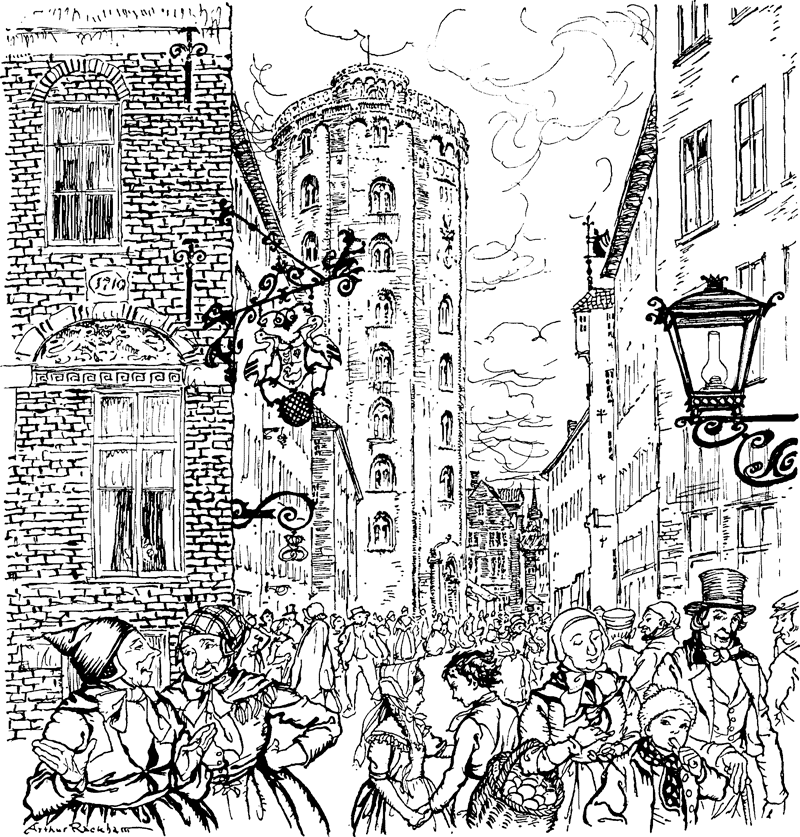
“But I was obliged to sail in another fashion, and that for many years, far away on long voyages.”
“Yes, I often cried about you,” she said. “I thought you were dead and gone, and lying down in the deep waters, rocked by the waves. Many a night I got up to look if the weathercock was turning. Yes, it turned indeed; but you did not come. I remember so clearly how the rain streamed down one day. The man with the cart who fetched away the dust came to the place where I was in service. I went down to him with the dust-bin, and remained standing in the doorway. What wretched weather it was! And just as I stood there the postman came up and gave me a letter. It was from you! How that letter had travelled about! I tore it open and read; I laughed and wept at once, I was so glad. There it stood written that you were in the warm countries where the coffee-beans grow. What a delightful land that must be! You told me so much, and I read it all while the rain was streaming down, and I stood by the dust-bin. Then somebody came and clasped me round the waist.”
“And you gave him a terrible box on the ear—one that sounded?”
“I did not know that it was you. You had arrived just as quickly as your letter. And you were so handsome; but that you are still. You had a long yellow silk handkerchief in your pocket, and a shiny hat on your head. You were so handsome! And, gracious! what weather it was, and how the street looked!”
“Then we were married,” said he; “do you remember? And then when our first little boy came, and then Marie, and Neils, and Peter and Hans Christian?”
“Yes, and how all of these have grown up to be respectable people, and every one likes them.”
“And their children have had little ones in their turn,” said the old sailor. “Yes, those are children’s children! They’re of the right sort. It was, if I don’t mistake, at this very season of the year that we were married?”
“Yes; this is the day of your golden wedding,” said the Elder Tree Mother, putting out her head just between the two old people; and they thought it was a neighbour nodding to them, and they looked at each other, and took hold of one another’s hands.
Soon afterwards came their children and grandchildren; these knew very well that it was the golden wedding-day; they had already brought their congratulations in the morning, but the old people had forgotten it, while they remembered everything right well that had happened years and years ago.
And the elder tree smelt so strong, and the sun that was just setting shone just in the faces of the old people, so that their cheeks looked quite red; and the youngest of their grandchildren danced about them, and cried out quite gleefully that there was to be a feast this evening, for they were to have hot potatoes; and the Elder Mother nodded in the tree, and called out “hurrah!” with all the rest.
“But that was not a story,” said the little boy who had heard it told.
“Yes, if you could understand it,” replied the old man; “but let us ask the Elder Mother about it.”
“That was not a story,” said the Elder Mother; “but now it comes; but of truth the strangest stories are formed, otherwise my beautiful elder tree could not have sprouted forth out of the tea-pot.”
And then she took the little boy out of bed, and laid him upon her bosom, and the blossoming elder branches wound round them, so that they sat as it were in the thickest arbour, and this arbour flew with them through the air. It was indescribably beautiful. Elder Mother all at once became a pretty young girl; but her dress was still of the green stuff with the white blossoms that Elder Mother had worn; in her bosom she had a real elder blossom, and about her yellow curly hair a wreath of elder flowers; her eyes were so large and blue, they were beautiful to look at. She and the boy were of the same age, and they kissed each other and felt similar joys.
Hand in hand they went forth out of the arbour, and now they stood in the beauteous flower garden of home. The father’s staff was tied up near the fresh grass-plot, and for the little boy there was life in that staff. As soon as they seated themselves upon it, the polished head turned into a noble neighing horse’s head, with a flowing mane, and four slender legs shot forth; the creature was strong and spirited, and they rode at a gallop round the grass-plot—hurrah!
“Now we’re going to ride many miles away,” said the boy; “we’ll ride to the nobleman’s estate, where we went last year!”
And they rode round and round the grass-plot, and the little girl, who, as we know, was no one else but Elder Mother, kept crying out.
“Now we’re in the country! Do you see the farmhouse, with the great baking-oven standing out of the wall like an enormous egg by the wayside? The elder tree spreads its branches over it, and the cock walks about, scratching for his hens; look how he struts! Now we are near the church; it lies high up on the hill, among the great oak trees, one of which is half dead. Now we are at the forge, where the fire burns and the half-clad men beat with their hammers, so that the sparks fly far around. Away, away to the nobleman’s splendid seat!”
And everything that the little maiden mentioned, as she sat on the stick behind him, flew past them, and the little boy saw it all, though they were only riding round and round the grass-plot. Then they played in the side-walk, and scratched up the earth to make a little garden; and she took elder flowers out of her hair and planted them, and they grew just like those that the old people had planted when they were little, as has been already told. They went hand in hand just as the old people had done in their childhood; but not to the round tower, or to the Fredericksberg Garden. No, the little girl took hold of the boy round the body, and then they flew here and there over the whole of Denmark.
And it was spring, and summer came, and autumn, and winter, and thousands of pictures were mirrored in the boy’s eyes and heart, and the little maiden was always singing to him.
He will never forget that; and throughout their whole journey the elder tree smelt so sweet, so fragrant; he noticed the roses and the fresh beech trees; but the elder tree smelt stronger than all, for its flowers hung round the little girl’s heart, and he often leaned against them as they flew onward.
“How beautiful it is here in spring!” said the little girl.
And they stood in the new-leaved beech wood, where the green woodruff lay spread in fragrance at their feet, and the pale pink anemones looked glorious among the vivid green.
“Oh, that it were always spring in the fragrant Danish beech woods!”
“How beautiful it is here in summer!” said she.
And they passed by old castles of knightly days, castles whose red walls and pointed gables were mirrored in the canals, where swans swam about, and looked down the old shady avenues. In the fields the corn waved like a sea, in the ditches yellow and red flowers were growing, and in the hedges wild hops and blooming convolvulus. In the evening the moon rose round and large, and the haystacks in the meadows smelt sweet.
“How beautiful it is here in autumn!” said the little girl.
And the sky seemed twice as lofty and twice as blue as before, and the forest was decked in the most gorgeous tints of red, yellow, and green. The hunting dogs raced about; whole flocks of wild ducks flew screaming over the ancient grave-mound, on which bramble bushes twined over the old stones. The sea was dark blue, and covered with ships and white sails; and in the barns sat old women, girls, and children, picking hops into a large tub: the young people sang songs, and the older ones told tales of magicians and goblins. It could not be finer anywhere.
“How beautiful it is here in winter!” said the little girl.
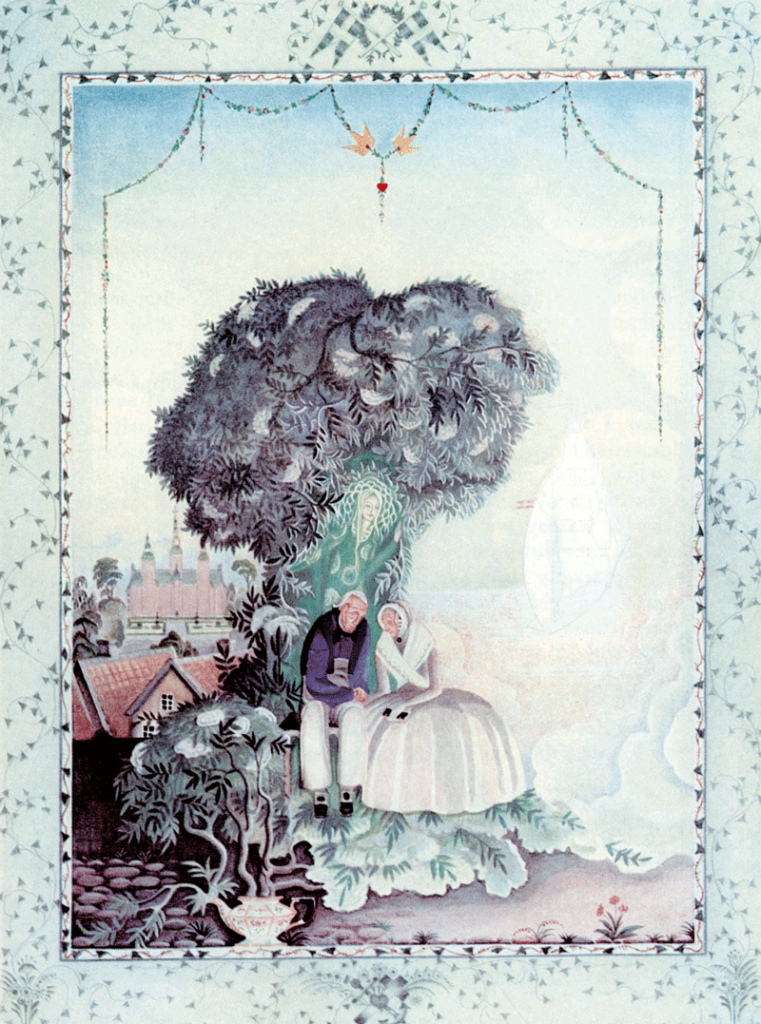
And all the trees were covered with hoar frost, so that they looked like white trees of coral. The snow crackled beneath one’s feet, as if every one had new boots on; and one shooting star after another fell from the sky. In the room the Christmas tree was lighted up, and there were presents, and there was happiness. In the country people’s farmhouses the violin sounded, and there were merry games for apples; and even the poorest child said, “It is beautiful in winter!”
Yes, it was beautiful; and the little girl showed the boy everything; and still the blossoming tree smelt sweet, and still waved the red flag with the white cross, the flag under which the old seaman had sailed. The boy became a youth, and was to go out into the wide world, far away to the hot countries where the coffee grows. But when they were to part the little girl took an elder blossom from her breast, and gave it to him to keep. It was laid in his hymn-book, and in the foreign land, when he opened the book, it was always at the place where the flower of remembrance lay; and the more he looked at the flower the fresher it became, so that he seemed, as it were, to breathe the forest air of home; then he plainly saw the little girl looking out with her clear blue eyes from between the petals of the flower, and then she whispered, “How beautiful it is here in spring, summer, autumn, and winter!” and hundreds of pictures glided through his thoughts.
Thus many years went by, and now he was an old man, and sat with his old wife under the blossoming elder tree: they were holding each other by the hand, just as the great-grandmother and great-grandfather had done before; and, like these, they spoke of old times and of the golden wedding. The little maiden with the blue eyes and with the elder blossoms in her hair sat up in the tree, and nodded to both of them, and said, “To-day is the golden wedding-day!” and then she took two flowers out of her hair and kissed them, and they gleamed first like silver and then like gold, and when she laid them on the heads of the old people each changed into a golden crown. There they both sat, like a King and a Queen, under the fragrant tree which looked quite like an elder bush, and he told his old wife of the story of the Elder Tree Mother, as it had been told to him when he was quite a little boy, and they both thought that there was so much in the story that resembled their own, and those parts they liked the best.
“Yes, thus it is!” said the little girl in the tree. “Some call me Elder Tree Mother, others the Dryad, but my real name is Remembrance: it is I who sit in the tree that grows on and on, and I can think back and tell stories. Let me see if you have still your flower.”
And the old man opened his hymn-book; there lay the elder blossom as fresh as if it had only just been placed there; and Remembrance nodded, and the two old people with the golden crowns on their heads sat in the red evening sunlight, and they closed their eyes, and—and—the story was finished.
The little boy lay in his bed and did not know whether he had been dreaming or had heard a tale told; the tea-pot stood on the table, but no elder bush was growing out of it, and the old man who had told about it was just going out of the door, and indeed he went.
“How beautiful that was!” said the little boy. “Mother I have been in the hot countries.”
“Yes, I can imagine that!” replied his mother. “When one drinks two cups of hot elder tea one very often gets into the hot countries!” And she covered him up well, that he might not take cold. “You have slept well while I disputed with him as to whether it was a story or a fairy tale.”
“And where is the Elder Tree Mother?” asked the little lad.
“She’s in the teapot,” replied his mother; “and there she may stay.”

